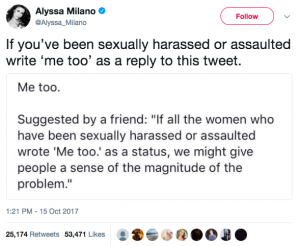Redefining masculinity: What this means to all of us
October 10, 2018
Haris Hosseini (12) is clear that we’ve got a ‘man problem’ to deal with. Pacing across the grey carpeted section of the Howard Nichols Court, he performed an original oratory, “The Man Problem”. His stare flickered from light and humorous to determined and grave, emotions changing with every beat. From jokes about Beyoncé to references to #MeToo, every single syllable outstretched to each corner of the room. As the final beat slowed, Haris’s last words, “our time is now”, echoed from the wooden structures of the gym. A wave of soundless reflection settled in the atmosphere. Yet, as if a bubble had burst, an impassioned applause tore away the silence, reverberating through the audience seconds later.
I discovered a new term, toxic masculinity, one that I was not surprised to not have heard of before. Even if not everyone agrees with Haris’s points, his words made a difference, and our certainly will too. It is time to redefine masculinity.
“I feel like nowadays we raise our boys to be strong rather than sensitive, tough rather than tolerant, violent rather than vulnerable,” Haris Hosseini (12) said.
As a society, regardless of gender or race, we need to start a conversation on toxic masculinity. The first step to change is to identify the problem, and only afterward can we start making a change in our society.
Toxic masculinity is defined as a stereotypical gender role that restricts the range of emotions boys and men can express, which, in turn, causes a belief in the inequality between men and women. Not to be confused with healthy masculinity, toxic masculinity inflicts problems and abuse upon society. Men who exhibit healthy masculinity hear the opinions of others, understand complex emotions and are not at fault nor the topic of this argument.
A survey on nature or nurture on gender differences qualifies the societal perceptions of masculinity in a study conducted by the Pew Research Center. 87% of respondents agree that women and men are different at expressing their emotions. More than half of the 87% ascribe this concept to societal expectations.
The discriminatory effects of this toxicity reaches many aspects of people’s lives, especially women’s. According to another survey by Pew Research Center, 42% of working women in the United States faced gender discrimination at their jobs. These women are three times as likely to personally experience sexual harassment than men. However, the effects of toxic masculinity is not only limited to physical abuse. 23% females said that they have been treated as incompetent at work because of their gender, versus 6% males. Additionally, toxic masculinity contributes to the lasting bias of women’s role in society. There is the gender pay gap: 25% of the women said to earn less than male coworkers, while only 5% vice versa.
In the age of #MeToo and #TimesUp, we are hearing more stories centered around the pain inflicted towards all people affected by this masculine toxicity. Most defining of this era is the ubiquitous exposure of criminal actions committed by men in powerful positions. Several women spoke out against Harvey Weinstein who was arrested for charges of rape, sexual abuse, and sexual harassment earlier this year. Whether the crimes committed under such a toxic culture happened decades ago or only recently, these people are speaking out now.
And now, as we clearly identified the issue, it is time that we must also follow the lead of these brave people in improving society.
A few days after Haris’s speech, I talked to him. With now a more intimate environment, without an audience of 800, we discussed the heart of the issue. Toxic masculinity derives from the current belief on the upbringing of boys. To implement change, we need to modify what we teach young children and what we expect or say to all males.
First, we need to know that toxic masculinity is not only seen on TV, but it also pervades everywhere, from school to work to the Supreme Court. As Haris said, “It’s in our language—they way we speak to boys and girls. When a boy is young, [you tell them] you run like a girl, cry like a girl. Then you move on to high school, and you hear no homo. If a guy touches another guy’s hand, you have to clarify that you’re not gay. What does that say about what we think about gay people? And the same thing goes with “runs like a girl.” What does that say about what we think about women?”
We must understand that the pervasiveness of this issue stems from the ubiquitous ideals taught to boys and to girls. Why are we comparing faults with femininity? Long-distance runner Shalane Flanagan runs like a girl as and sets American records. Why are we so obsessed with emotionless masculinity? Healthy relationships stem from transparency and expression.
To fully change the perceptions of society, we all need to mobilize. Now it is our turn to make a footprint. Let’s stop comparing substandard athletic abilities to women. Let’s stop marginalizing the capabilities of women. Let’s stop restricting emotions males are “allowed” to exhibit. Instead, let’s encourage young boys to express their feelings, and let’s inspire all children to pursue their dreams and break down gender barriers. Now it’s your turn.


















![“[Building nerf blasters] became this outlet of creativity for me that hasn't been matched by anything else. The process [of] making a build complete to your desire is such a painstakingly difficult process, but I've had to learn from [the skills needed from] soldering to proper painting. There's so many different options for everything, if you think about it, it exists. The best part is [that] if it doesn't exist, you can build it yourself," Ishaan Parate said.](https://harkeraquila.com/wp-content/uploads/2022/08/DSC_8149-900x604.jpg)




![“When I came into high school, I was ready to be a follower. But DECA was a game changer for me. It helped me overcome my fear of public speaking, and it's played such a major role in who I've become today. To be able to successfully lead a chapter of 150 students, an officer team and be one of the upperclassmen I once really admired is something I'm [really] proud of,” Anvitha Tummala ('21) said.](https://harkeraquila.com/wp-content/uploads/2021/07/Screen-Shot-2021-07-25-at-9.50.05-AM-900x594.png)







![“I think getting up in the morning and having a sense of purpose [is exciting]. I think without a certain amount of drive, life is kind of obsolete and mundane, and I think having that every single day is what makes each day unique and kind of makes life exciting,” Neymika Jain (12) said.](https://harkeraquila.com/wp-content/uploads/2017/06/Screen-Shot-2017-06-03-at-4.54.16-PM.png)








![“My slogan is ‘slow feet, don’t eat, and I’m hungry.’ You need to run fast to get where you are–you aren't going to get those championships if you aren't fast,” Angel Cervantes (12) said. “I want to do well in school on my tests and in track and win championships for my team. I live by that, [and] I can do that anywhere: in the classroom or on the field.”](https://harkeraquila.com/wp-content/uploads/2018/06/DSC5146-900x601.jpg)
![“[Volleyball has] taught me how to fall correctly, and another thing it taught is that you don’t have to be the best at something to be good at it. If you just hit the ball in a smart way, then it still scores points and you’re good at it. You could be a background player and still make a much bigger impact on the team than you would think,” Anya Gert (’20) said.](https://harkeraquila.com/wp-content/uploads/2020/06/AnnaGert_JinTuan_HoHPhotoEdited-600x900.jpeg)

![“I'm not nearly there yet, but [my confidence has] definitely been getting better since I was pretty shy and timid coming into Harker my freshman year. I know that there's a lot of people that are really confident in what they do, and I really admire them. Everyone's so driven and that has really pushed me to kind of try to find my own place in high school and be more confident,” Alyssa Huang (’20) said.](https://harkeraquila.com/wp-content/uploads/2020/06/AlyssaHuang_EmilyChen_HoHPhoto-900x749.jpeg)










